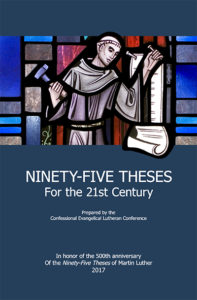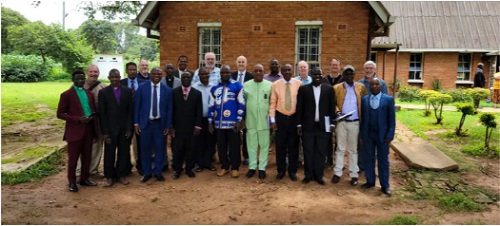
The difference between new and old brooms is summarized in a proverb. “The new broom sweeps clean, but the old broom knows the corners.” The meaning is that while youth brings energy to a situation, people with experience bring more knowledge.
A fresh set of eyes helps you see things you’ve overlooked or grown accustomed to. The Africa Regional CELC gathering in Lusaka, Zambia this month brought together both new and old WELS mission partners. The former brought fresh perspective and energy. The latter brought experience and encouragement. The exchange was invaluable for all.
A Practical Conference
The agenda set real-life ministry issues before the delegates. The first presentation addressed the pros and cons of church-run businesses. One of the “new brooms” represented at the conference was the LCMC-Kenya. Its president, Rev. Mark Anariko Onunda, delivered a paper on this topic. He wrote, “Our churches are poor and the poverty of the church workers leads to a crisis of the spirit.” Generally speaking, African pastors are poorly compensated by their members, due to various factors. Many African pastors operate small business ventures to help support their families. Some are more skilled at managing their time and money than others.
The first community of believers chose seven deacons to manage the financial affairs of the church. They left the apostles free to give their attention to prayer and the ministry of the word (Ac 6:4). Rev. Onunda noted that skilled laypeople can run church businesses well. Pastors should concentrate on the spiritual needs of their flocks.
Training Shepherds
One Africa Team Leader Rev. Howard Mohlke led a Bible study on Christian service, both private and public. The number of organized African congregations is much higher than the number of ordained clergymen available to serve them. Many view the term “pastor” as a title of respect rather than as a calling to serve. Rev. Mohlke noted that the word “pastor” is a verb that means “to shepherd”. The shepherd’s job is to care for the needs of the sheep. All Christians have the gifts and responsibility to personally serve one another as members of Christ’s body. Some Christians have been called to serve in public ministry on behalf of the congregation. The essence of their work as public ministers is the same as that of all Christians. It is a humble, Spirit-filled service that focuses people’s attention on the Gospel of Christ.
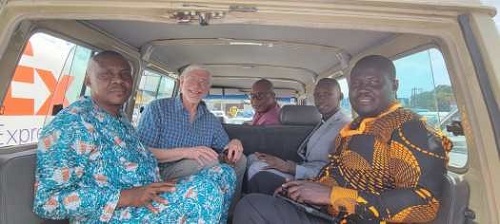
Traveling to lunch at a local restaurant
The LCCA Zambia is one of the “old brooms”. One of the WELS’ oldest Gospel partners in Africa, Rev. Davison Mutentami is its President. His presentation touched on the kind of training needed for a healthy church. In his words, “Africa has been invaded by prophets and preachers from all walks of life. Africans have been invaded by teachings that are likely to deny them a chance to receive the true message of salvation by grace.” Many churches are led by people with no formal or informal Biblical training. Several African governments are considering legislation to require that pastors obtain a degree from an accredited institution.
But training should not be limited to members of the clergy. One size does not fit all. There are many local church leaders who would benefit from training tailored to their needs and abilities. The curriculum of many Lutheran seminaries is a treasured heritage to be sure. However, there are other practical skills to learn that will benefit both pastors and their congregations. One of the delegates, a layperson, made the following insightful comment. “Theological education’s purpose isn’t to turn a man into a gospel minister, but to help him do gospel ministry.” That kind of training will certainly result in a healthy church.
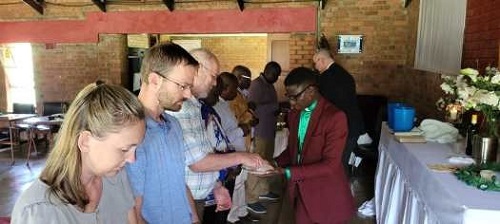
Communion worship service
A Layperson’s Perspective
An accountant by trade and a former Treasurer of the LCCA Zambia, Mr. Zororai Shoko delivered the fourth presentation. He very effectively demonstrated the need for financial accountability and transparency in the church. Mr. Shoko made his case by citing examples from both the Bible and recent case studies. He wrote, “Whenever a person in power – especially the power of handling finances – tries to avoid transparency and accountability, the Church is in danger.”
When Mr. Shoko served as the treasurer of a local congregation, members asked to borrow funds from the general offerings. He refused, even though this had been standard practice in the past. Some congregations did not have bank accounts, but offerings were handled single-handedly either by the treasurer or the pastor. This lack of checks and balances has damaging consequences for the pastor and the church. According to one study, in 2019 Christian organizations were estimated to have lost $68 billion due to fraud. In the same timeframe, donors were expected to give $60 billion for worldwide mission work.
Part of the reason for low offerings is a spiritual problem, but another is the lack of accountability. Fiscal malfeasance is endemic in the government. Nevertheless, Mr. Shoko remarked that “people expect more from the church than from the government.” The solution to these problems is simple. The church must establish clear procedures for counting, depositing, and accounting for funds entrusted to them. In the absence of such procedures, sinful human beings will take advantage of the opportunity. Mr. Shoko shared this final anecdote: A thief was asked if he would give up stealing. His reply: “Not if they remain so careless.”
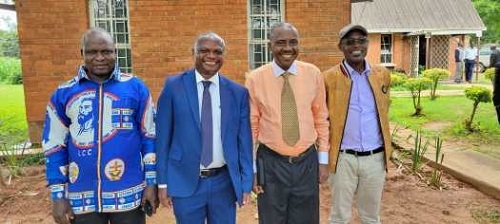
(L-R) Africa CELC officers: Rev. Mathias Abumbi (Vice-Chairman),
Rev. Davison Mutentami (Chairman). Mr. Effraim Adiuko (Treasurer),
Rev. Mark Onunda (Secretary)
Prayer Requests
Delegates from each of the seven synods attending the CELC Africa Regional meeting presented a brief history of their church bodies. They also mentioned requests for prayers. May I ask you to join me in praying for our African brothers?
• The Lutheran Church of Cameroon: pray that God end the current war that has led members from seven congregations to flee the region
• The LCMC-Kenya: pray that God will relieve the current famine and grant peaceful relations between various ethnic groups in the country
• The LCCA-Malawi Synod: pray that God will empower the leaders of the congregations and the synod as a whole to use offerings in a transparent and accountable way
• Obadiah Lutheran Synod (Uganda): pray that God will help them train church leaders and build up their church body’s infrastructure
• The LCCA-Zambia Synod: pray that God will grant pastors the courage to serve under extremely difficult circumstances and give the church body spiritual growth
• All Saints Lutheran Church of Nigeria: pray that God grant church members spiritual maturity
• The Lutheran Church of Ethiopia; pray that God grant more faithful leaders and financial stability for the church
• Christ the King Lutheran Church of Nigeria pray that God bless the church body’s leadership to serve both God and the members faithfully
May God bless the efforts of both new and old brooms to sweep souls into His Kingdom everywhere!
Written by Missionary John Roebke who lives in Malawi
This article was first distributed by WELS Friends of Africa whose website is here.
